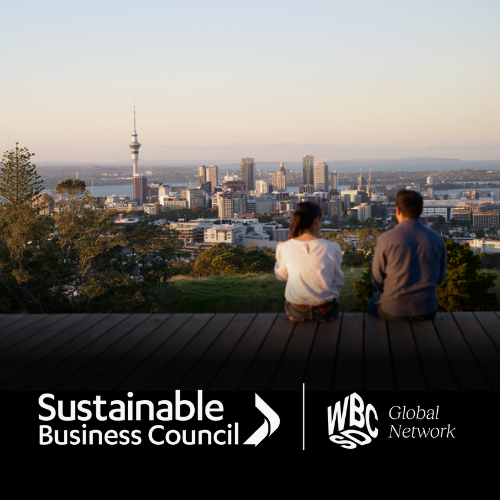In the latest out of Glasgow for SBC and Climate Change Leaders Coalition members, New Zealand journalist Rod Oram sets the scene of the thriving venue that is the COP26 complex. He also expands on his discussion with The Warehouse Group’s David Benattar around the challenges of getting countries working better together in the form of global collective action, and the power of business ecosystems.
Transcript
Kia ora tatou and welcome back to the COP26 climate negotiations in Glasgow for this, the third of my four reports to you members of the Sustainable Business Council and the Climate Leaders Coalition.
I’m sitting here at the central intersection of the vast COP campus through which many of the almost forty thousand delegates stream through each day. I’m recording this at eight o’clock in the evening when the flow of people has diminished quite a lot, although there’s still an awful lot going on in the negotiating rooms, and because we’re in the intense last two and a bit days left before the midnight Friday deadline for COP’s closing, this intersection is actually where it all comes together because running this way is the main concourse through the totally enclosed campus of permanent and temporary buildings. At least a brisk 15-minute walk from end to end from east to west. It’s basically politicians that way in country office and and this way in civil society in the vast spread of pavilions exhibitions and meeting rooms back that way. And here the concourse intersects this way and with another major thoroughfare and this one has the main plenary meeting rooms that way. One is big enough to seat a small group of delegates from each country in the world, 194 here, plus some observers and lots of media and and somewhat smaller plenary room. And then in the opposite direction is a vast rabbit warren of negotiating rooms and if you go past that there’s an enormous cafeteria for staff which I managed to sneak into at one point to try to catch up with someone.
Now we know some good decisions will be made here at COP, but likely and nowhere near enough to put humanity on a plausible path to net zero emissions and thus a more manageable temperature rise of only 1.5 degrees centigrade. And it’s on this main thoroughfare that brings together so many of these people but of course none of these people can act or survive on their own – has their indispensable role to play in society so the utterly vital challenge is to get them all working better together for each other, for the sake of their nations, and then all nations collectively for the sake of the planet. You’ll hear some more of that from David Benattar, the Chief Sustainability Officer of The Warehouse who is here at COP26. I interviewed David earlier today, and I hope you enjoy our accompanying video.
It’s very clear here at COP that leading businesses across almost all sectors have become in recent years a great deal more sophisticated, capable, and ambitious about their climate responses and are rapidly building alliances with all sorts of other parties, not just in their own sector but widely across civil society and to bring those into effect and also then to scale up their ambitions. One particular example came on Saturday, which was the announcement from the five largest UK supermarket groups that their goal is to reduce the negative environmental impact of the contents of their consumers’ typical shopping basket by 50 percent by 2030 and very notably, they’re working with the World Wildlife Fund on all the measures they will need to achieve that and to report on it with a lot of transparency. To do all that of course will mean they will work very closely with all the companies in their supply chains from the very largest and to the smallest over time. That understanding of the power of business ecosystems and the constructive roles every one of them can play, all the members can play, is a very crucial that and that understanding it’s a very crucial driver of sustainability in all its dimensions and is one fundamental to what’s going on here and I hope that this is just a tip of an iceberg around the world.
Now while we’ll hear plenty from business in the next two and a bit last days of COP, all the focus inevitably will be on the work of politicians and civil servants from country delegations trying to reach agreement on the big breakthroughs. Now in the final statements from COP, likely as I say, in the early hours of Saturday morning, some of the headlines inevitably will be disappointing. On for example, the scale of countries’ pledges on emission reductions. But I think it’s really important to take the final agreement in its entirety and take a bit of time to work out what all the new commitments, what the reinforced commitments, what the new ambitions are to get a true picture of COP so I’ll be trying to do that and I look forward to bringing news of that in my fourth and final report for you, just after or as COP26 is closing. Until then, ma te wa.

